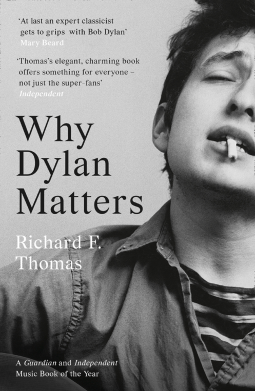
Why Dylan Matters
by Richard F. Thomas
This title was previously available on NetGalley and is now archived.
Send NetGalley books directly to your Kindle or Kindle app
1
To read on a Kindle or Kindle app, please add kindle@netgalley.com as an approved email address to receive files in your Amazon account. Click here for step-by-step instructions.
2
Also find your Kindle email address within your Amazon account, and enter it here.
Pub Date 16 Nov 2017 | Archive Date 28 Feb 2018
HarperCollins UK, 4th Estate | William Collins
Description
A GUARDIAN AND INDEPENDENT BEST MUSIC BOOK OF 2017.
‘At last an expert classicist gets to grips with Bob Dylan’ Mary Beard
‘Thomas’s elegant, charming book offers something for everyone – not just the super-fans’ Independent
When the Nobel Prize for Literature was awarded to Bob Dylan, the literary world was up in arms. How could the world’s most prestigious book prize be awarded to a famously cantankerous singer-songwriter in his Seventies, who wouldn’t even deign to make an acceptance speech?
In Why Dylan Matters, Harvard Professor Richard F. Thomas answers that question with magisterial erudition. A world expert on Classical poetry, Thomas was initially ridiculed by his colleagues for teaching a course on Bob Dylan alongside his traditional seminars on Homer, Virgil and Ovid. Dylan’s Nobel prize win brought him vindication. This witty, personal volume is a distillation of Thomas’s famous course, and makes a compelling case for moving Dylan out of the rock n’ roll Hall of Fame and into the pantheon of Classical poets. You’ll never think about Bob Dylan in the same way again.
Available Editions
| EDITION | Ebook |
| ISBN | 9780008245481 |
| PRICE | £7.99 (GBP) |
| PAGES | 208 |
Average rating from 3 members
Featured Reviews
'I've been sitting down studying the art of love | I think it will fit me like a glove.' (Thunder on the Mountain)
The only Art of Love I knew was the three-book poem of Roman poet Ovid, a playful early work, a 'how-to' for those looking to get and keep a romantic partner. But Modern Times didn't seem to have much to do with that poem, but rather, if anything, with the last poems Ovid wrote.
This extract epitomises what I both liked about this book and yet also highlights its weaknesses: on one hand Thomas takes Dylan seriously as a lyricist and argues that there's no necessary distinction between poetry and song lyric: after all, as he points out, ancient and classical poetry was often sung rather than merely read, and Orpheus, the model of the poet as vates, was famous for his singing to a lyre accompaniment. That accepted, reading Dylan's lyrics intertextually makes perfect sense and that's what Thomas claims to be doing.
The problem, though, is that rather than reading or analysing intertexts, Thomas merely identifies them, and sometimes those identifications are very loose. In the example above, he claims Ovid's Ars Amatoria from Dylan's direct reference but then jumps to his Tristia and Epistulae ex Ponto instead; and the only real analysis is the rather vague claim that Dylan adopts the mask of nostalgic exile from Ovid. Oh, but then Thomas claims that Dylan also takes similar tropes from Homer's Odysseus, and the Beat poets, and perhaps Dante exiled from Florence...
The blurb focuses on Dylan's classicism, but actually the book touches on all kinds of other literary influences: Shakespeare, Thomas Campion, Thucydides, Machiavelli, Rimbaud, Verlaine, Plutarch. As already noted, though, Thomas notes them in passing, doesn't analyse what they might be doing in, and for, Dylan's lyrics.
There are places where he even undermines his own tentative arguments: 'Dylan did not need Ovid in order to bring out the nostalgia of remembering; indeed most of these instances above are from songs written before he read Green's 1994 translation. But in Ovid he found a kindred spirit.' It's simply not enough to state, for example, that both Dylan and Catullus took their greatest inspiration from unhappy love - it's no doubt true, but that doesn't mean that Dylan was influenced by Catullus, and there are many, many poets and poems that equally articulate the sufferings of love.
For all my disappointment in the scholarly aspects of the book (and it's clear to see why this hasn't been published by an academic press) I really enjoyed reading it - Thomas' sensitivity to Dylan and his lyrics comes through strongly, and his sharing of his love and knowledge makes this addictively readable. As a mere Dylan neophyte I learned a huge amount and, perhaps most importantly, it sent me back to Dylan's music. I just think the blurb makes it sound like a different book from what it actually is.



